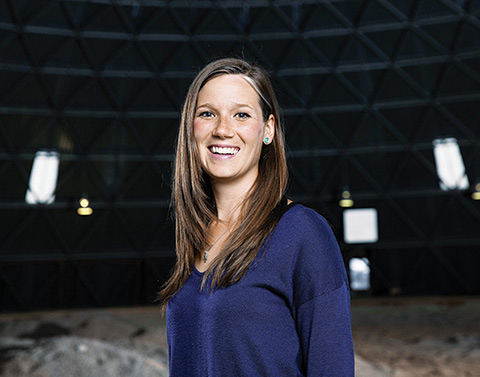On a trip to Baffin Island last summer, Natalie Panek (MASc 2009) and a friend hiked for 100 kilometres among mountains and glaciers without encountering a single person. “I like to go to places that are very remote, where I can have that feeling of maybe being the first one to step foot in a specific place.” For now, those places are here on Earth. In the future, she hopes they will be somewhere else in the universe.
The aspiring astronaut, current aerospace engineer, explorer and high-profile advocate for women in science says her passion for exploration is rooted in a childhood of camping and outdoor adventures in Alberta. “It really fostered a curiosity in me to know more about what’s out there,” she says. In her teens, a sci-fi TV show called Stargate SG-1 and the real-life accomplishments of astronaut Roberta Bondar (PhD 1974) expanded this wanderlust to include extraterrestrial worlds.
Today, Panek designs technology destined for space. MDA, a global communications company, hired her in 2010 to work on the Next Generation Canadarm. She has helped design robotic arms that could potentially be used for repairing and refuelling satellites that are integral to our communications systems – a possible solution for the “dead” satellites currently orbiting the Earth. In October, she spoke at TEDxToronto (her third TED talk) about how this robotic technology could allow more sustainable space exploration.
Panek’s current focus is designing and building the chassis – or frame – and locomotion system for the European Space Agency’s 2018 ExoMars Mission rover. “Our team is responsible for determining how the rover will drive on Mars and survive, given challenges like Mars dust, driving over rocks and extreme temperature changes,” she says.
As one of few women in her field, Panek is committed to encouraging and advising young women considering careers in the hard sciences. She volunteers for two online mentorship programs – where she often corresponds with U of T students – speaks and publishes widely, and maintains a website (thepanekroom.com) aimed at sparking girls’ interest in pushing the boundaries in their studies, work and travels. For her efforts, she was named one of Forbes 30 Under 30 this year, and to the Women’s Executive Network’s “Canada’s Most Powerful Women: Top 100” list in 2014.
Panek is fully aware that she may never get to space, given that Canada currently has only two active astronauts, but she has lived her life preparing for the possibility. She earned her private pilot’s license while she was an engineering student at the University of Calgary. At U of T’s Institute for Aerospace Studies, she researched combustion in a simulated microgravity environment. Partway through her studies at the university, Panek secured an internship at NASA’s Goddard Space Flight Center where she had her first hands-on experience with space technology. “It was an opportunity that helped get me to where I am today, and that was because U of T allowed me the flexibility,” she says.
At this point in her career, Panek says striving toward her end goal is just as important as reaching it. “It drives me to have really cool experiences, and use them to make a difference. If I get to space, I get there. If I don’t, I’m not going to have any regrets.”
Natalie Panek speaks about her work on the Mars rover and her experience at U of T






